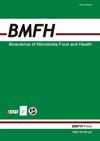Establishment of porcine fecal-derived <i>ex vivo</i> microbial communities to evaluate the impact of livestock feed on gut microbiome
IF 2.9
4区 医学
Q2 Agricultural and Biological Sciences
引用次数: 0
Abstract
Sustainable livestock production requires reducing competition for food and feed resources and increasing the utilization of food by-products in livestock feed. This study describes the establishment of an anaerobic batch culture model to simulate pig microbiota and evaluate the effects of a food by-product, wakame seaweed stalks, on ex vivo microbial communities. We selected one of the nine media to support the growth of a bacterial community most similar in composition and diversity to that observed in pig donor feces. Supplementation with wakame altered the microbial profile and short-chain fatty acid composition in the ex vivo model, and a similar trajectory was observed in the in vivo pig experimental validation. Notably, the presence of wakame increased the abundance of Lactobacillus species, which may have been due to cross-feeding with Bacteroides. These results suggest the potential of wakame as a livestock feed capable of modulating the pig microbiome. Collectively, this study highlights the ability to estimate the microbiome changes that occur when pigs are fed a specific feed using an ex vivo culture model.建立猪粪源性离体研究体系;微生物群落评价家畜饲料对肠道微生物组的影响
可持续畜牧业生产需要减少对粮食和饲料资源的竞争,并增加对牲畜饲料中食品副产品的利用。本研究描述了厌氧间歇培养模型的建立,以模拟猪的微生物群,并评估一种食品副产物——wakame海藻秸秆对体外微生物群落的影响。我们选择了九种培养基中的一种来支持细菌群落的生长,这些细菌群落在组成和多样性上与猪供体粪便中观察到的最相似。在离体模型中,添加裙带菜改变了微生物谱和短链脂肪酸组成,在猪体内实验验证中也观察到类似的轨迹。值得注意的是,裙带菜的存在增加了乳酸菌种类的丰度,这可能是由于与拟杆菌交叉喂养。这些结果表明裙带菜作为一种能够调节猪微生物群的家畜饲料的潜力。总的来说,这项研究强调了使用离体培养模型估计猪饲喂特定饲料时微生物组变化的能力。
本文章由计算机程序翻译,如有差异,请以英文原文为准。
求助全文
约1分钟内获得全文
求助全文
来源期刊

Bioscience of Microbiota, Food and Health
Immunology and Microbiology-Applied Microbiology and Biotechnology
CiteScore
5.50
自引率
3.20%
发文量
24
期刊介绍:
Bioscience of Microbiota, Food and Health (BMFH) is a peer-reviewed scientific journal with a specific area of focus: intestinal microbiota of human and animals, lactic acid bacteria (LAB) and food immunology and food function. BMFH contains Full papers, Notes, Reviews and Letters to the editor in all areas dealing with intestinal microbiota, LAB and food immunology and food function. BMFH takes a multidisciplinary approach and focuses on a broad spectrum of issues.
 求助内容:
求助内容: 应助结果提醒方式:
应助结果提醒方式:


